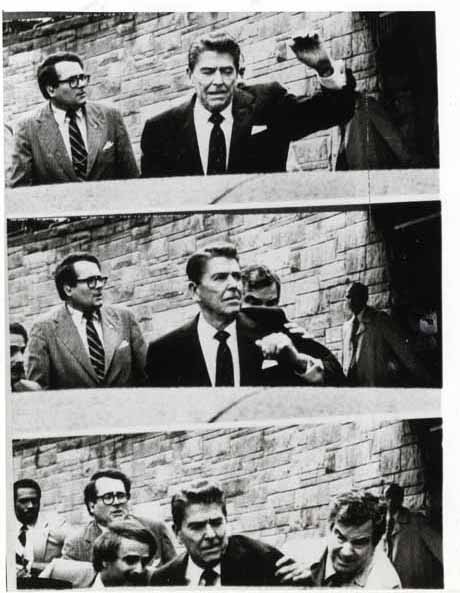Reagan Roundtable: The Art of the Deal
Thursday, February 17th, 2011
Ronald Reagan’s monicker as President was always “the Great Communicator“, for his command of message and the medium of television, though Reagan had a considerable ability to read a live audience as well. Everyone acknowledged Reagan’s rhetorical wizardry, even his Democratic critics, who took some comfort in imagining that Reagan was “only a B movie actor” reading his lines. A nickname that would have pointed to one of his greatest political skills would have been “the Great Negotiator” because Reagan’s talent for winning favorable outcomes, legislatively and diplomatically, is rivaled among presidents only by FDR and LBJ. Yet few pundits give Reagan that credit of being a master of the art of the deal.
Reagan’s strategic insight has been alluded to previously in this roundtable and the ability to look at a big picture and construct a strategy for acheiving favorable ends, using acceptable and effective ways that are within your means is the cornerstone of being a good negotiator. Reagan’s career as an actor is frequently cited but it is forgotten that if they gave out Oscars for running the Screen Actor’s Guild, Reagan would have cleaned up at the academy awards. He was a tough union boss and Reagan’s deft handling of contract negotiations with the studios, winning substantial concessions for actors in a politically charged, anti-Hollywood atmosphere, led to his being elected president of SAG seven times:
“At the request of the SAG National Board, Reagan returned to the SAG presidency in 1959 in order to head 1960
theatrical negotiations that ultimately resulted in the first pension and health plan for SAG members, not to mention residuals on filmsshot January 31, 1960, and after (once they were replayed on television).”
Not having anticipated the advent of television, having little bargaining leverage and facing punitive tax rates, many early film actors lived hand to mouth in their old age while the studios raked in a fortune selling their performances to TV networks. Most had been paid a pittance and the lucky few who had made real money had found Uncle Sam claimed up to 90 % of their paycheck. Reagan never forgot that bitter experience and made decreasing marginal income tax rates a key objective in his economic program, which he managed to get through a Democratic-controlled House of Representatives under the Speakership of Tip O’Neill. How? He negotiated for it and afterward, liberal Democrat Tip O’Neill paid conservative Republican Reagan the ultimate compliment that a political opponent can bestow:
How am I doing? I’m getting the whale shit kicked out of me!
As the former Speaker explained in his memoirs, belying his image as a genial and somewhat lazy figurehead, Reagan was a shrewd but relentless bargainer. “You fellas tell me who I need to call and I’ll make the calls” Reagan told his staff. Reagan called. He worked the phones like the winner of a national sales award. Congressmen, Senators, their supporters and newspaper editors back home, he charmed the wives of members of Congress, asked after their children and hand wrote them personal letters of thanks and gave them photo ops at the White House. He shared the spotlight and made compromises with Democrats like Bill Bradley and Dan Rostenkowski who were willing to advance Reagan’s strategic goals. Walking in to the conference room to talk with the Democratic leadership, Reagan would frequently begin discussions having dozens of their Democratic members in his pocket and an equal number wavering. Reagan would at the last minute, take half a loaf in legislation if it moved the ball down the field. Then in the next negotiation, he’d return for the other half and often as not, get some of that too.
The Soviet politburo fared no better with arms control with Reagan than did the leaders of the Democratic party on tax cuts and tax reform. That Reagan was disinclined to make the sort of breezy, one-sided, concessions that had been the hallmark of Kissinger’s approach to SALT was made dramatically clear by Reagan’s appointment of Paul Nitze, the father of NSC-68 and co-founder of Team B, as his adviser on arms control and chief negotiator foe the INF treaty talks. Reagan’s propensity to treat the Soviets in his public speeches as if their Communist ideology were illegitimate and dangerous gave the Soviet leaders fits.
Longtime Soviet ambassador to the United States, Anatoly Dobrynin remained a dedicated Communist apparatchik and a skillful advocate of the Soviet position even after the demise of the USSR, but his comments about Reagan in his memoir In Confidence, while laden with frustration and incomprehension, are not the picture often seen of Reagan in the MSM:
-
- Brezhnev and his colleagus found themselves dealing with something truly new, a deeply disturbing figure who tenaciously advanced a course that profoundly offended and alarmed them.
- To me, the directness and insouciance of his remarks confirms once again my belief that personal conviction underwrote Reagan’s approach to the Soviets and everything associated with us, and not just some political pose.
- It was evident from Shultz’s Behavior during our White House conversation and long afterward that Reagan was the real boss, and that the secretary of state carried out his instructions. Shultz hardly intervened in the conversation and ostensibly agreed with Reagan throughout. I even had the impression, perhaps an erroneous one, that the secretary of state was somewhat afraid of the president.
As Dobrynin’s memois meander slowly, as diplomatic tomes are wont to do, the Soviets ultimately, by stubborn, painful inches born of endless meetings, bent to many of Reagan’s positions, orginally regarded by them as absolutely intolerable: the zero option, exit visas for Pentacostal dissidents, SDI research and most dramatic of all, consenting to the tearing down of the Berlin Wall, occurring the year Reagan left office.
Ronald Reagan, not Mikhail Gorbachev, understood the art of the deal.



